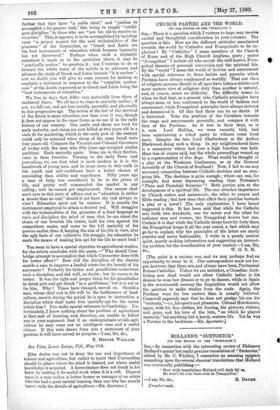CHURCH PAMIRS AND THE WORLD.
CFO THE EDITOR OP THE "SPECTATOR:)
SER,—There is a question which I venture to hope may receive careful and thoughtful consideration in your columns. The question is this. How are the different attitudes maintained towards the world by Catholics and Evangelicals to be ex- plained? By " Catholics " I mean members of the Church of Rome and of the High Church Anglican party ; under "Evangelical" I include all who accept the well-known Evan- gelical theories of personal conversion and the spiritual life. By the "world" I mean the world of fashion and amusement with special reference to those habits and pursuits which Puritans have always condemned as worldly. That one class of religious persons should in all ages have taken a stricter and more austere view of religious duty than another is natural, and, of course, raises no difficulty. The difficulty comes in when we find that, as a general rule, Catholic principles have always more or less conformed to the world of fashion and amusement, while Evangelical principles have always resisted and denounced it. Of this fact there can be no doubt. It is historical. Take the position of the Cavaliers towards the stage and amusements generally, and compare it with that of the Puritans. As it was in their days, so is it now. Lord Halifax, we were recently told, had been entertaining a select party to witness some local races. Imagine the late Lord Shaftesbury or Sir Arthur Blackwood doing such a thing. In my neighbourhood there is a monastery where last year a high function was held. Mass was of course said, but the whole proceedings wound up by a representation of Our Boys. What would be thought of a play at the Wesleyan Conference, or at the General Assembly of the Church of Scotland? Now, I fail to see any necessary connection between Catholic doctrine and an easy- going life. The doctrine is grim enough; where can one, for example, find more depressing reading than Newman's "Plain and Parochial Sermons"? Both parties aim at the development of a spiritual life. The one attaches importance to Church orders and sacraments, the other to prayer and Bible reading ; but how does that affect their position towards a play or a novel? The only explanation I have heard suggested is this. It has been said that while the Catholic sets forth two standards, one for saints and the other for ordinary men and women, the Evangelical knows but one. Certain it is that while the Catholic keeps Lent for forty days, the Evangelical keeps it all the year round, a fact which may go far to explain why the principles of the latter are rarely popular and never fashionable. I write in a purely neutral spirit, merely seeking information and suggesting an interest- ing problem for the consideration of your readers.—I am, Sir, W. 0.5. M.
[The point is a curious one, and we may perhaps find an opportunity to recur to it. Our correspondent must not for- get, however, that there are, and always have been, Puritanical Roman Catholics. Unless we are mistaken, a Canadian Arch- bishop now dead would not allow Catholic ladies in his diocese to wear low dresses or to go to dances, while in Spain in the seventeenth century the Inquisition would not allow the painters to make studies from the nude. Again, the Puritans were far less austere than is usually believed. Cromwell expressly says that he does not grudge his son his " contents,"—i.e., his sports and pleasures. Colonel Hutchinson, again, with his fine clothes, his fencing, his pictures, statues, and gems, and his love of the lute, "on which he played masterly," led anything but a harsh, austere life. Yet he was a Puritan to the backbone.—ED. Spectator.]






































 Previous page
Previous page